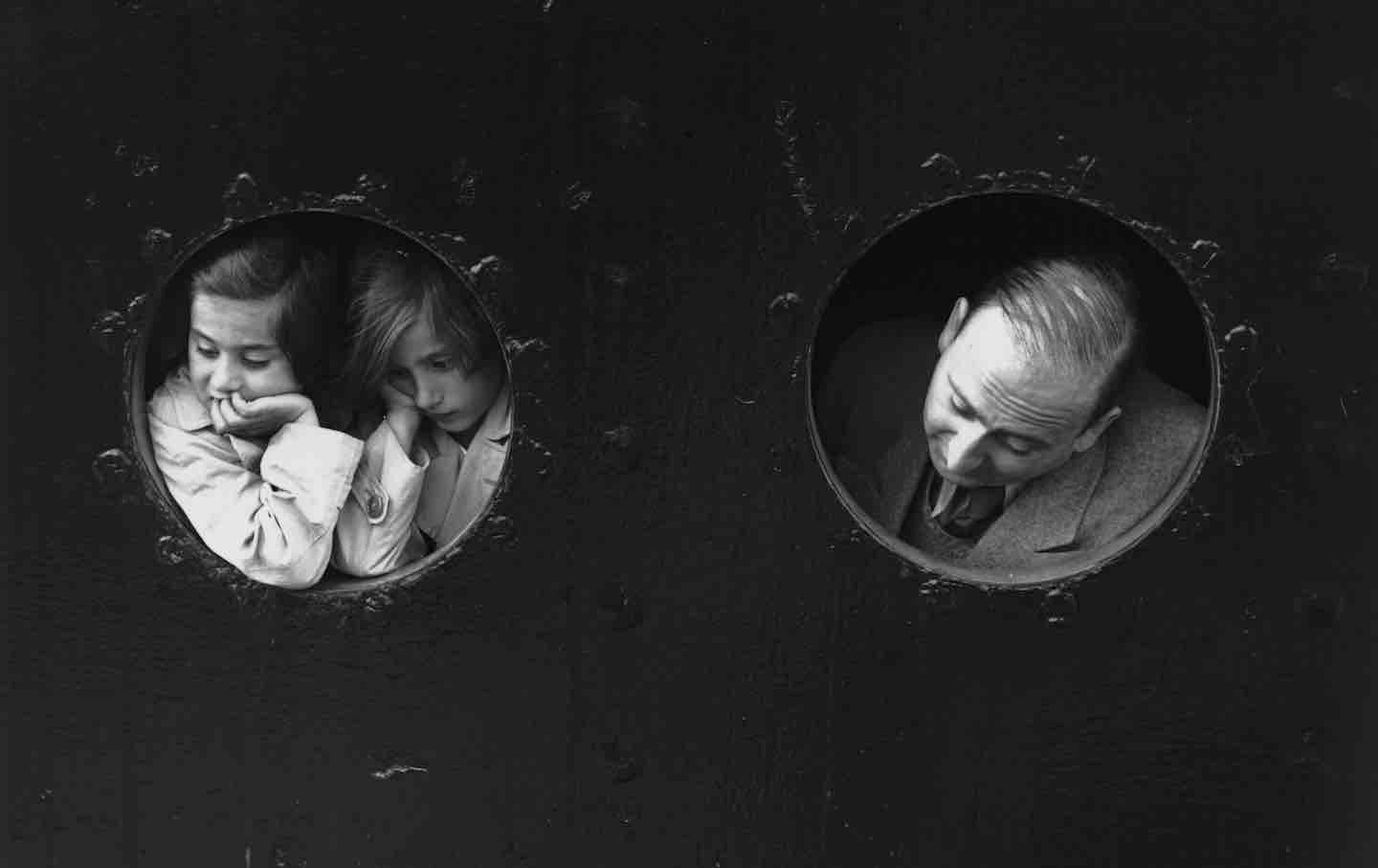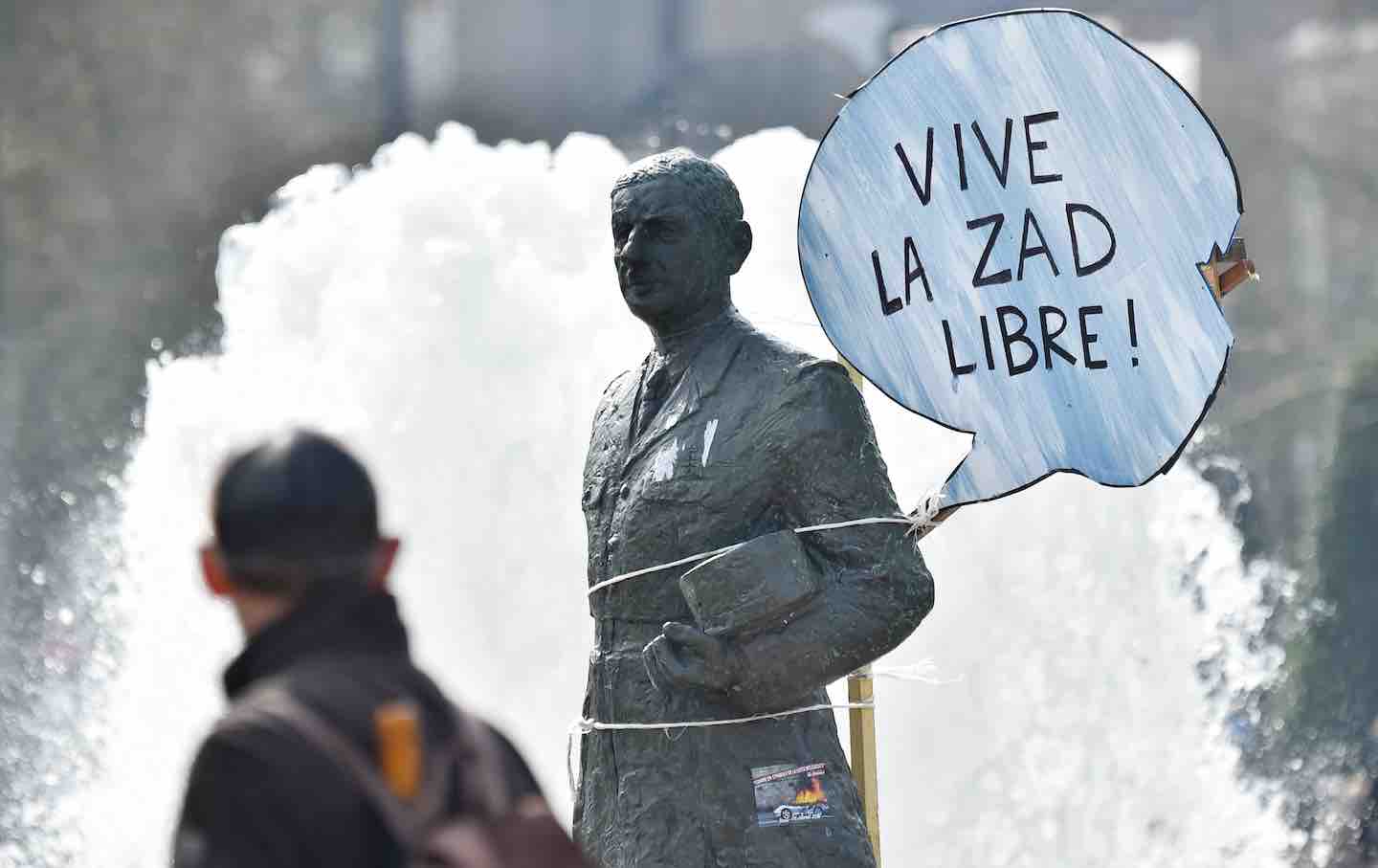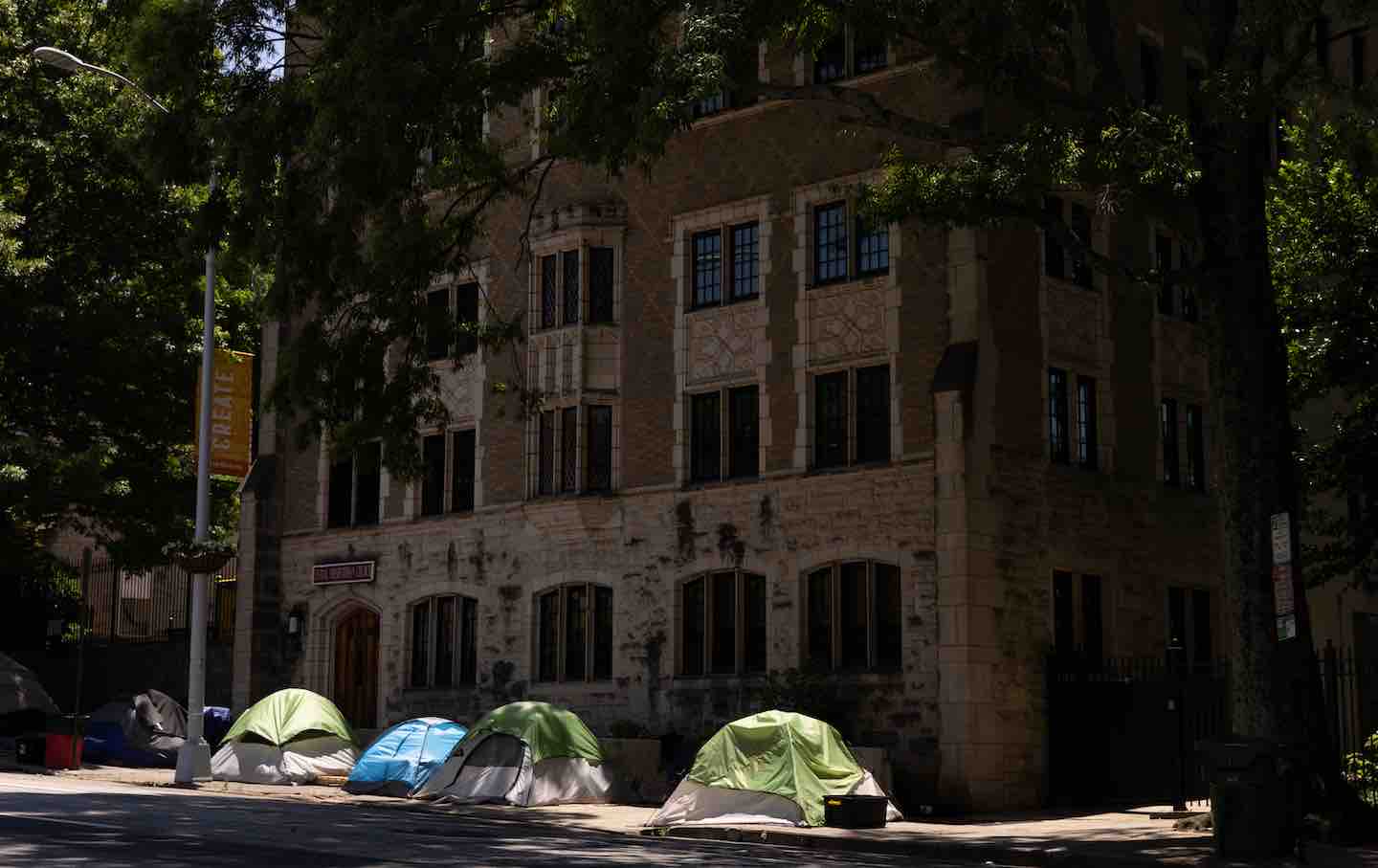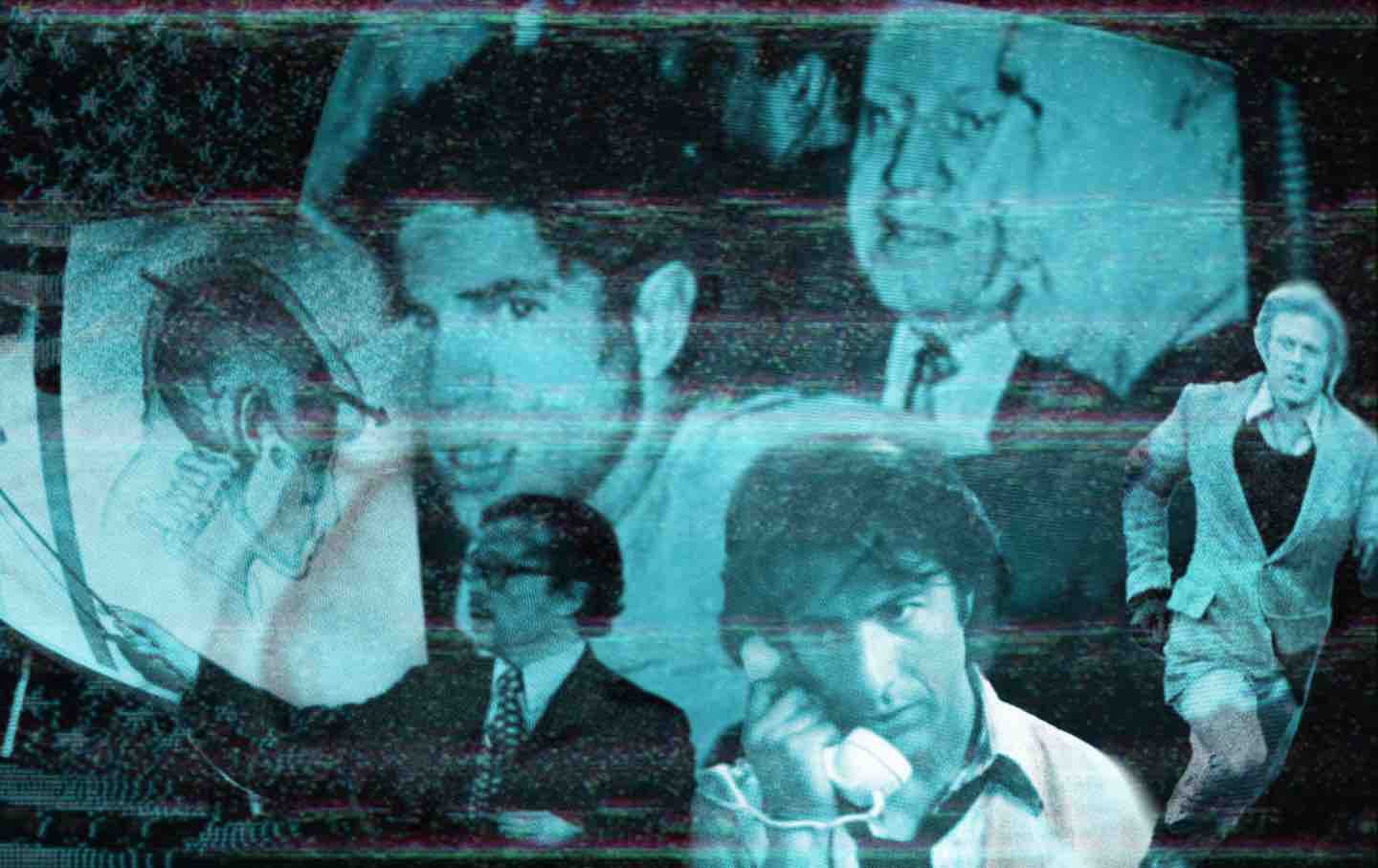What the Jewish History of Exile Means Now
A recent book on Jewish identity before and after Zionism shows the limitations of a progressive critique that doesn’t truly account for the experience of Palestinians.

German Jewish refugees looking through portholes aboard an ocean liner arriving in Antwerp, 1939.
(Gerry Cranham / Fox Photos / Getty Images)
From the late 19th century through the early 20th, Jewish thinkers in Eastern Europe’s Pale of Settlement dreamed up paths as varied as the stars to lead them out from under the yoke of oppression. The Jewish Labor Bund, a socialist movement that emerged at the turn of the century, argued that Jews should embrace the lands in which they found themselves. They advocated doikayt, a Yiddish word meaning “hereness”; wherever Jews were, the Bund argued, was their home. Others were drawn to communism’s international horizon, joining a struggle to free all workers from exploitation across ethnic and national lines.
Books in review
The Necessity of Exile: Essays from a Distance
Buy this bookReligious Jews, on the other hand, stayed true to the rabbinic decree of exile that had guided their lives for millennia. Against the winds of emancipation and assimilation that swept through 19th-century Europe, pious Jews held on tight to their way of life no matter where they landed.
Zionism proposed a different solution to the Jewish problem. The movement emerged in the 1880s in the wake of pogroms in the Russian Empire, and later more formally with the development of political Zionism by Theodor Herzl. It quickly became wide-ranging and multifarious: Zionism included a cultural revitalization project, a Hebrew-language revival, and a political organization called Brit Shalom, supported by the likes of Martin Buber and Gershom Scholem, which advocated for a binational project in Palestine.
Figures ranging from the labor Zionist A.D. Gordon to the revisionist Zionist Ze’ev Jabotinsky believed that settling land in Palestine would transform the Jewish people. For Gordon, European Jewry would be transformed by agricultural labor; for Jabotinsky, by conquest. Statist Zionists often adopted the antisemitic notions of their oppressors, painting the “old Jew” of the shtetl as parasitic and effeminate. They also adopted their political calculus. Perennially marginalized by state power, the Jews of Europe had built palaces in time and memory. Statist Zionists proposed that they build up an army and a country instead, taking lessons from the völkisch nations that had subjugated them. In the 1930s and ’40s, the push within Zionism to create a Jewish nation-state in Palestine came to dominate, and eventually unite, the movement.
Before World War II, Zionism was only one among many frameworks competing to determine the direction that the European Jewish future would take. But in the wake of the Holocaust, and with the birth of the state of Israel, the legs of the once lively debate were cut out from under it. Nazism destroyed Jewish life in Europe, and those who survived made homes in the United States, Israel, and elsewhere. The new state of Israel also solved a post-War problem for the Western imperial powers that backed its creation: many fewer Jewish survivors would have to be re-integrated into European societies, or to migrate to America. Exile, which had long ordered the existence of the Jews of Europe, had seemingly come to an end; for many Palestinians, it had only just begun. In founding the state of Israel, Zionist militias violently displaced 800,000 Palestinians from their homes in the catastrophic fracturing of Palestinian society known as the Nakba (“catastrophe”).
In his book The Necessity of Exile: Essays From a Distance, Shaul Magid returns to the period before Zionism came to dominate Jewish communal life in order to consider the alternatives that had preceded it and to reanimate one concept in particular—the concept of exile. Drawing on a range of Jewish thinkers and traditions, from ultra-Orthodox anti-Zionism to Israeli post-Zionism, from Hannah Arendt to Judith Butler, Magid discusses exile “as both an idea and an empirical reality” that was long fundamental to Judaism itself. He is inspired by what the Rabbi Shimon Gershon Rosenberg (Rav Shagar) calls the “not-yet”—the idea embedded within Judaism that the messianic, redemptive era has not yet arrived. For Jews living in foreign lands, disenfranchised and subject to antisemitic violence, exile had become a teacher. From exile’s instruction, they understood that the world was perennially broken, and that their work consisted in its mending. Though the exilic paradigm was left behind by most Jewish thinkers in the middle of the 20th century, the lessons gleaned from exile are ripe for reclamation.
Magid’s attempt at reclamation, however, is undergirded by a new reality: a world transformed by the acceleration of Israel’s genocidal campaign against the Palestinian people. As Israel wages its war on Gaza, the lion’s share of Jewish institutions in America and abroad have continued to stand by its side. At the same time, Jews of all backgrounds are bewildered, bereaved, enraged, and torn apart, within their families and communities. They have joined Jewish anti-occupation organizations and the Palestinian solidarity movement en masse. For those who are urgently seeking out non- Zionist and anti-Zionist Jewish lineages, Magid’s book, published in November of 2023, is a lifeline, albeit a flawed one.
Magid did not know that The Necessity of Exile would be published in the midst of a war when he was writing it, but this timing nevertheless informs its reception. In his introduction, Magid sets out narrow parameters for his study that limit the salience of its lessons: The book “engages the question of exile and Zionism from an exclusively Jewish perspective,” he writes. “I acknowledge that this book does not include Palestinian voices or Palestinian narratives…. This is not meant as a slight in any way, but is rather a consequence of positionality.” In its progressive forms, intra-Jewish discourse about Israel and Palestine attempts to address the pain that Jews have inherited from persecution, and to unsettle the Zionist narratives that capitalize on it. However, this discourse too often excuses the supremacist logic of Zionism and the material reality of occupation for Palestinians, further entrenching the narratives that it intends to dismantle.
Magid derives the title of his book from a passage on the teachings of Rabbi Yoel Teitelbaum, the former leader of the Satmar Hasidic sect, which was founded in Hungary and reconfigured after World War II in Williamsburg, Brooklyn. Though he managed to escape the Nazis by way of Mandatory Palestine, Teitelbaum was a fierce anti-Zionist. Like many other ultra-Orthodox anti-Zionists, he believed that ever since the destruction of the Second Temple in Jerusalem in 70 CE, “Jewish destiny remained deeply embedded in its exilic state, which would only culminate through religious observance and the coming of the Messiah.” In trying to hasten that process by human means, the Israeli state, in his view, was committing heresy.
In his 1960 work Vayoel Moshe, Teitelbaum interprets a Talmudic passage based on the biblical verse “For I have spread you abroad as the four winds of the heaven, says the Lord.” He writes, “Just as the world cannot exist without wind, so too, the world cannot exist without the Jewish people…. the winds never cease.” Teitelbaum’s exegetical stance is clear—Jews ought to be dispersed throughout the world. According to Kabbalistic texts, when the universe was created, divine sparks were scattered throughout it. Teitelbaum believed that Jews were spread throughout the diaspora in order to lift these divine sparks up to their proper place in the cosmos. For him, Jewish exile was theologically necessary.
Teitelbaum offers one of many interpretations of Jewish life to be found in Magid’s book that arrive at a similar conclusion: Living in exile is a spiritual and political state of being as much as a physical one. Magid cites Eugene Borowitz, a former leader of American Reform Judaism, who wrote, “Anybody who cares seriously about being a Jew is in Exile and would be in Exile even if that person were in Jerusalem. That Exile results because our Jewish ideal is unrealized anywhere in the world.” Later on, Magid shares a passage with a similar sentiment from Isaac Bashevis Singer: “When all nations realize that they are in exile—exile will cease to be.” For Borowitz and Singer, exile is an existential state that illuminates the perpetual brokenness of the world, and the obligation to work toward its repair.
In a chapter titled “Exile in the Land,” Magid writes at length about the post-Zionism of Rav Shagar, an Israeli scholar and rabbi who advocated exilic thinking even from within the state of Israel. Shagar was inculcated in the teachings of Rav Zvi Yehuda Kook, whose foundational religious Zionist theology harmonized the secular Zionist movement that built the state with the messianic Jewish timeline. He eventually broke with Kook, arguing that the competing narratives that defined the state of Israel— “the Israeli, the Haredi, and the Arab,” in his words—could not be synthesized. Instead, Shagar argued that while Zionism had served its purpose, it had essentially exhausted itself. (Part of what motivated Shagar and his students to break from mainstream religious Zionism was Israel’s unilateral withdrawal from Gaza in 2005, during which multiple religious Zionist settlements were forcibly removed by the IDF. They experienced this removal as proof that Zionism did not unify secular and religious Jews but pitted them against one another. Magid notes that many settlers “viewed the Gaza evacuation as a catastrophe and compared it, without irony, to the Nakba.”)
Shagar believed that to understand the current state of Israel, one had to embrace a “postmodern” view in which multiple fragmented narratives exist side by side. Though now empowered with a nation-state, he contended, Jews ought to incorporate the lessons learned from the humbling posture of exile that had ordered their lives for so long, abandoning ethno-nationalism in favor of multiculturalism.
Here, the limitations of a project that seeks to depart from Zionism but that does not include Palestinian voices is laid bare. Shagar’s critique of Israel is motivated by the Jewish experience of sovereignty. The scholar Atalia Omer, observing a number of Jewish critics of Zionism, identifies this kind of critical intervention as part of a pattern whose “primary impetus is a repair of Judaism…rather than redressing the harms that Jews have inflicted on Palestinians as the starting point for grappling with ethics in post-Holocaust Jewish modernity.” Too often, critical discourse among Jews about the Israeli occupation seeks to rehabilitate Jewish identity from the cruelty of Zionism, rather than to reckon with Israel’s treatment of Palestinians on Palestinian terms. Instead of wishing Zionism would fade into the past, attempting to reclaim its earlier iterations, or seeking refuge in diasporist fantasies that ignore Israel altogether, we must confront the ideology’s expression as genocidal violence against the Palestinian people from the Nakba to the present day.
Magid shares many critical insights about the state of Israel as it functions today, but in articulating these, he mostly sidesteps the question of whether establishing a Jewish state in Palestine was ever a moral solution to Europe’s Jewish problem. Instead, he asks, “What if we shelved Zionism? What if we viewed it, with all its warts and caveats, as an important historical movement in its time, but one that has outlived its purpose?”
Popular
“swipe left below to view more authors”Swipe →The writer and poet Mohammed el-Kurd wrote in these pages that “Zionism is best defined by its material manifestations—the most recent being genocide.” El-Kurd’s framing raises the stakes of any investigation of the Zionist past undertaken as Israel continues its campaign of destruction in Gaza: What does an ideology’s history matter when we can see its consequences so clearly?
I was raised within American schools and synagogues that taught Zionism as a necessary outcome of the Holocaust and as one chamber of the heart of Jewish identity. Among Jews who came of age in similar communities, and who are attempting to break free from Zionism’s grasp, Omer and El-Kurd provide a path forward. Heeding their words means insisting on an analysis of Zionism that is rooted in the experiences of Palestinians.
Magid gestures toward a Jewish future untethered from Zionism and guided instead by an ongoing struggle for justice rooted in Jewish tradition. The defining Jewish contribution that he hopes to recover is the “not-yet.” This is the idea that we are never redeemed but in the act of redemption; we are never fulfilled but seeking fulfillment. As on Yom Kippur, the Jewish Day of Atonement, our wrongdoing weighs upon our necks, even as we hope to be released from it. Guided by this ethos, Magid argues that redemption has “not yet” arrived for the Jewish people, and instead that the Jewish conception of exile must define our way forward in the world. However, while Magid calls on a vital set of rabbinic and cultural traditions, they alone cannot offer an adequate alternative to Zionism and the miserable reality that the Zionist state has created for the Palestinian people.
In his lecture “Freud and the Non-European,” Edward Said speaks about Moses, born to a Hebrew mother and raised as an Egyptian royal. Said draws political insight from Moses’ dual character: “The founder of Jewish identity was himself a non-European Egyptian. In other words, identity cannot be thought or worked through itself alone.” What might be possible if we understood Jewish identity through the prism of Jews’ historical interrelationships with other peoples? The contemporary movement of Jews standing in solidarity with Palestinians and seeking to create an alternative Jewish future can glean much from Moses’ story. Like Moses, we must break open every shackle before our wandering is complete.








